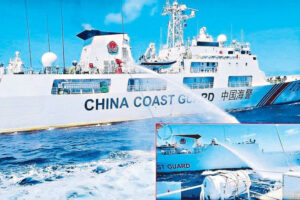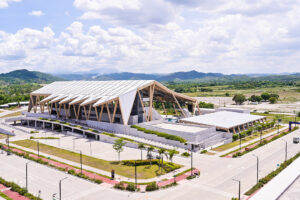Handling China’s doublespeak and cognitive dissonance

On Saturday, Aug. 5, the Chinese Coast Guard fired water cannons at Philippine boats on a resupply mission to the BRP Sierra Madre, off Ayungin Shoal. The incident within our Exclusive Economic Zone was just the latest among the many aggressive moves by China in the West Philippine Sea.
The Philippines, intending to use what had been identified as a direct line between our two countries, reached out to China in the crucial hours of the crisis. There was no answer, leading many to believe that the absence of a response was, in itself, a message.
This incident provided a good backdrop for a workshop organized by the Stratbase ADR Institute a few days later. We, together with our partners the United States Institute of Peace and Australian Aid, held a total of five panel discussions on Aug. 10 and 11. We explored the role of communications during crisis situations. Experts from the government, the academe, and think tanks joined us as we sought to make sense of the past days’ events and how these events fell under the greater context of China’s continued coercive acts in our very own territory.
Former Supreme Court Associate Justice Antonio Carpio identified five flashpoints in Philippine-China relations — Ayungin Shoal, which is right within our Exclusive Economic Zone, is one of them — and said the latter’s recent acts are grounded on China’s new Coast Guard law. The 2021 law authorizes the Chinese Coast Guard to use necessary measures, including force, to assert territorial and maritime claims. This law is a blatant violation of international law which says disputes must be settled peacefully.
Former United States Air Force official and security expert Col. Raymond Powell described China as an “extremely large and aggressive country” while Stratbase non-resident fellow Dr. Robin Garcia said China is the biggest existential threat to the Philippines. Former Foreign Affairs Secretary Jose Rene Almendras said crisis communication with China was “extremely complex.”
Senior analyst Amanda Hsiao of the International Crisis Group said China views communication not as a functional but as a political act that must be performed according to its own pace, and that for the Chinese, the act of initiating communications signals an acceptance of responsibility for its actions.
Dr. Charmaine Willoughby of the De La Salle University said words and syntax have the power to either deter or inflame, and that the Philippines should put more teeth into its words.
Panelists agreed that China’s refusal to engage in dialogue, its apparent doublespeak and cognitive dissonance, are due to its unique mindset. They dwelled on the issue of how we can continue pursuing peaceful means of defending our established territory when the other party refuses to even acknowledge the premise of a dialogue — that they are infringing on what is rightfully ours.
Nobody is saying we should stop talking, and so we should, through whatever means available. Crucial to this effort are our allies who have manifested their support for our arbitral win and their valuable help in boosting our defense capabilities. As former Secretary Almendras said, “it is friends that help get that phone answered.” In this digital age, we should also take active steps to fight disinformation that seeks to deceive Filipinos. We should “civilianize” the issue, according to National Security Council Assistant Director General for Strategic Communications Jonathan Malaya, so that more and more Filipinos would be aware of the stakes.
Finally, geoeconomics could be key. Security issues do not exist on their own; they cannot be decoupled from economic and other equally compelling issues because they are intimately linked with each other. If we can get them to keep talking about economics, we are at least keeping communication lines open.
Our security challenges are many and daunting. Coming from the approach taken by the previous administration, the current leadership’s initial steps have been encouraging. Still, we can afford to send a clearer, firmer message.
Col. Powell said the response has been necessary but not sufficient.
This, then, is the perfect opportunity for President Ferdinand Marcos, Jr. to show that he was not just resorting to rhetoric when he said that only national interest will drive foreign policy.
I take comfort in the fact that the Philippines is a proud part of the community of nations committed to defend the rules-based international order. The threats we face are many, multifaceted, and evolving. Ultimately, we go back to our alliances with countries that share our values and our reverence for what is just, fair, and decent.
Let these common ideals drive us to work together with greater fervor in defending peace. This noble pursuit is something higher and bigger than us all.
Victor Andres “Dindo” C. Manhit is the president of the Stratbase ADR Institute.




